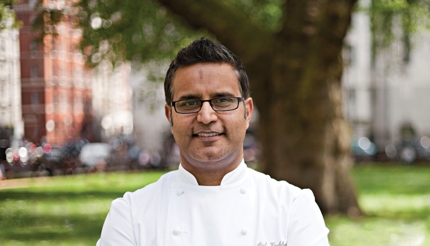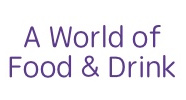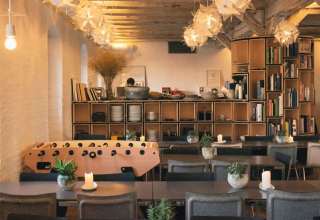Atul Kochhar tells Adam Lechmere about his experience of Diwali, a celebration of light over darkness and the most important festival in the Hindu calendar
-
In a delicious five-course feast, four top Indian chefs share their favourite recipes for the upcoming festival of Diwali
-
We review Vicky Bhogal’s award-winning Cooking Like Mummyji, which reveals the secret of real Indian home cooking
Atul Kochhar was the first Indian chef to receive a Michelin star, when he was head chef at London’s Tamarind in 2001; he then went on to open the acclaimed Benares Restaurant & Bar for which he was awarded his second Michelin star in 2007. He grew up in Bengal and is now based in London.

How do you traditionally celebrate Diwali? Diwali is a week-long festival. Some of the religious aspects of the holiday are slowly losing their significance but the main three days of Diwali are very important. On the third day we celebrate Lakshmi Puja, where you buy a brass or copper pot, and you hope the goddess of wealth – Lakshmi – will fill that with her blessings and lots of money.
Does the whole family take part? Yes, the whole family will go out to choose the pot – it’s a very simple thing made of common material but we make a ceremony out of it, with a meal afterwards and the family enjoying the time together.
What time do you start the day? Early in the morning! Everyone in the family is given new clothes, and we exchange gifts, then in the evening we do Puja together and worship Lakshmi, the goddess of wealth, lighting lamps all over the house, in the garden and in the street, and all the neighbours join in. The idea is to light the house up so the goddess doesn’t have any difficulty finding your house.
And then there are the fireworks… That’s a major part of the ceremony. In the evening the whole street comes together to do the fireworks. Now in a lot of communities they pool their money and bring in specialists to do the displays. A city like Delhi gets totally smoked up at Diwali – sometimes the smoke from the fireworks is so bad that it’s difficult for planes to land.
In the west, Christmas is becoming more and more secular – is the same thing happening with Diwali? Kind of. In modern India it has has got more social significance than religious, and for many Hindus living in the UK it’s become like Christmas. It used to be a completely vegetarian feast, for example, but as time goes by people are bending the norms.
What about alcohol – do you have wine with the meal? Being a religious festival, alcohol traditionally doesn’t have a place in Diwali. However, in modern India, any alcohol goes – wine or spirits, or beer.
What styles of wine would you serve with a Diwali meal? Go for younger wines and wines from new world – look for Alsace and Chile, grapes like gewurztraminer and sauvignon blanc, merlot and pinot noir. Light-bodied, fruity wines. Heavy wines just don’t go with Indian food. Beers, like IPA, also go naturally very well with Indian food – the British have proved that for us.
What are some typical dishes served at Diwali? Hinduism is a broad religion, and it’s practised in many ways in different parts of India. There’s no uniform recipe or dish. I came from a Punjabi household but grew up in eastern India, so there were family traditions but because we lived near Kolkata we adopted Bengali influences. That enriched me – I understood two parts of my country while growing up.
Sweet things seem to play a large part in the celebrations… There was always a lot of sugarcraft. Special patisserie chefs make beautiful toys with sugar – I remember going to the market with my father purely so I could buy loads of sweet toys. There are lots of different sweets, and an incredibly sweet rice pudding from northern India.
There are so many parallels with Christmas – the family celebration, the use of lights, the focus on sweets – these things are all done with children in mind, aren’t they? It’s true. It’s the children who dictate the way the festivals are celebrated. So many customs are designed to entice the children to draw them into the culture.






